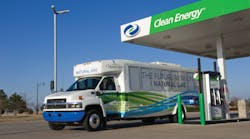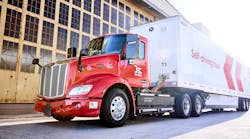As the price of fuel at the pump continues to rise, truck fleets continue to look for a realistic alternative fuel option. One such option that has been gaining in popularity is natural gas.
Trucks and engine manufacturers have been coming out with additional natural gas models. More natural gas fueling facilities are opening across the U.S. and Canada, particularly along well-traveled corridors. More North American production is coming on line to help make natural gas a more readily accessible fuel.
There are several reasons why natural gas vehicles (NGVs) are increasing in abundance and popularity. To begin with, natural gas is an economic alternative to gasoline and diesel fuels.
"With the rising cost of diesel, the comparatively inexpensive price of natural gas reduces operating costs," says Greg Treinen, segment manager, distribution and services/alternative fuels product marketing for Freightliner Trucks. "Over the past five years, natural gas fuel prices have been consistently well below diesel fuel prices, and have been more consistent, avoiding the fluctuations in prices caused by speculation and the current geopolitical climate."
A vehicle using compressed natural gas (CNG) can reduce annual fuel costs up to 40 percent, assuming 25,700 miles per year driven, gasoline priced at $3.50/gallon and CNG at $2.09/gasoline gallon equivalent, according to Chesapeake Energy Corporation, the second-largest producer of natural gas and a Top 15 producer of oil and natural gas liquids in the U.S. This represents savings totaling as much as $1,500 per fleet vehicle per year.
CHEMICAL COMPOSITION
Due to the chemical composition of natural gas, it is the cleanest burning engine technology, Treinen says. That provides an environmental benefit as greenhouse gas (GHG) emissions are reduced by up to 20 percent versus comparable diesel engines.
"The deployment of natural gas vehicles are not only cleaning the air through reduced GHG levels, but also through the reduction in truck noise, which helps keep local neighborhoods and delivery locations quieter and helps with driver comfort, helping their productivity," he notes. "On average, natural gas engines run 10 decibels quieter than a comparable diesel engine."
Natural gas is very safe. Being lighter than air, in the event of an accident, natural gas dissipates into the air instead of forming a dangerous flammable pool on the ground like other liquid fuels. This also prevents the pollution of ground water in the event of a spill.
Another plus for natural gas is that it is a domestic fuel source. "In terms of future resource security, North America has an abundance of natural gas reserves, which helps reduce dependence on foreign oil, says Treinen.
FUEL FACTORS
With the right spec'ing choices, many truck fleets have the potential to realize significant reductions in emissions and fuel costs by specifying natural gas power, particularly if they're replacing trucks with older diesel engines, says Andy Douglas, Kenworth Truck Company's national sales manager for specialty markets.
A good starting point is two primary considerations, he says. The first is the type of natural gas available in a fleet's operating area: liquefied natural gas (LNG) or CNG. The second consideration is the operating range the trucks typically travel.
Before choosing CNG or LNG, it is important to take inventory of natural gas stations in your area and along their operating routes, he recommends.
"Currently, many local transit and government agencies use CNG to power trucks and buses, so that fuel source may be easier to find," says Douglas. "Meanwhile, the natural gas infrastructure available to the public is expanding at an accelerated rate across the United States and Canada along well-traveled transportation routes."
For example, in March, Chesapeake Energy announced a collaboration with GE to develop infrastructure solutions that will help accelerate the adoption of natural gas as a transportation fuel. As part the collaboration, GE will provide more than 250 modular and standardized CNG compression stations, also known as CNG In A Box, for NGV infrastructure.
Clean Energy Fuels Corp., the largest provider of natural gas fuel for transportation in North America and a global leader in the expanding natural gas vehicle market, is continuing development of its America's Natural Gas Highway. This is a network of LNG and CNG fueling stations at strategic locations along major trucking corridors to form the backbone of a national transportation fueling infrastructure.
The first phase includes 150 fueling stations with approximately 70 anticipated to be open in 33 states by year's end and the balance in 2013. Many will be co-located at Pilot-Flying J Travel Centers.
"It's amazing the amount of infrastructure activity that's happened in the past five years," Douglas observes. "It may not be too long before we'll see enough natural gas stations along key interstate corridors for trucks to be able to travel from Los Angeles to New York and back."
OPERATING RANGE
Along with checking the natural gas fuel availability on truck routes, it is important to take into account operating range, says Douglas. "In general, if your operating range is over 400 miles, it's usually best to go with LNG. Under 400 miles, CNG can be an option.
"CNG can be used up to 66,000 pounds gross vehicle weight (gvw), with some severe duty applications going up to 80,000 pounds gvw."
In addition to available fuel type, be sure to check each station's ease of truck accessibility and its capability to fill commercial truck volumes, he adds. Most CNG stations compress the gas into onsite storage cylinders which can then dispense the natural gas fuel into truck fuel tanks as quickly as diesel fuel.
"Drivers can refuel CNG-powered trucks without needing to go through special training," he notes. "LNG is a cyrogenic fuel and so those vehicles must be refueled by properly trained individuals."
ONBOARD FUEL TANKS
As far as fuel tank selection, there is sometimes a tendency to overspec when choosing natural gas tanks since operators are in the habit of carrying a two-to-three day supply of fuel on their diesel trucks, says Douglas.
"In many cases, it's often impractical to carry much more than a day's supply of natural gas. Natural gas fuel tanks also can be expensive, so consider carrying only enough fuel for a full-day's work, plus a 10 percent reserve."
He advises specifying Type 4 CNG cylinders, which are the lightest weight, but also the most expensive option. Type 4 tanks have a plastic core and are fully wrapped with a composite, such as carbon fiber.
Other less expensive options are Type 2 and Type 3 CNG tanks. These have a steel or aluminum core and are composite wrapped.
All CNG tanks are high-pressure vessels.
Kenworth, like other truck OEMs, offers a number of tank options for order on its natural gas trucks. Fuel tank placement depends on the type of truck, chassis configuration, equipment specification choices and how much fuel is needed to be carried.
"It's important to carefully consider the possible impact of tank placement choices on wheelbase length, weight distribution and turning radius," Douglas says.
ROI
The fuel savings, coupled with the longer trade cycles that some vocational operators already experience with their trucks, can make a positive return on investment (ROI) on natural gas-powered trucks attainable now, even without government incentives, says Douglas.
He says the Clean Cities Alternative Fuel Price Report can be a help in determining whether the savings from alternative fuels can provide a high enough ROI. The report, updated every three months, offers a comparison of CNG, gasoline, diesel and biodiesel fuels on a straight price comparison basis and an energy-equivalent basis.




